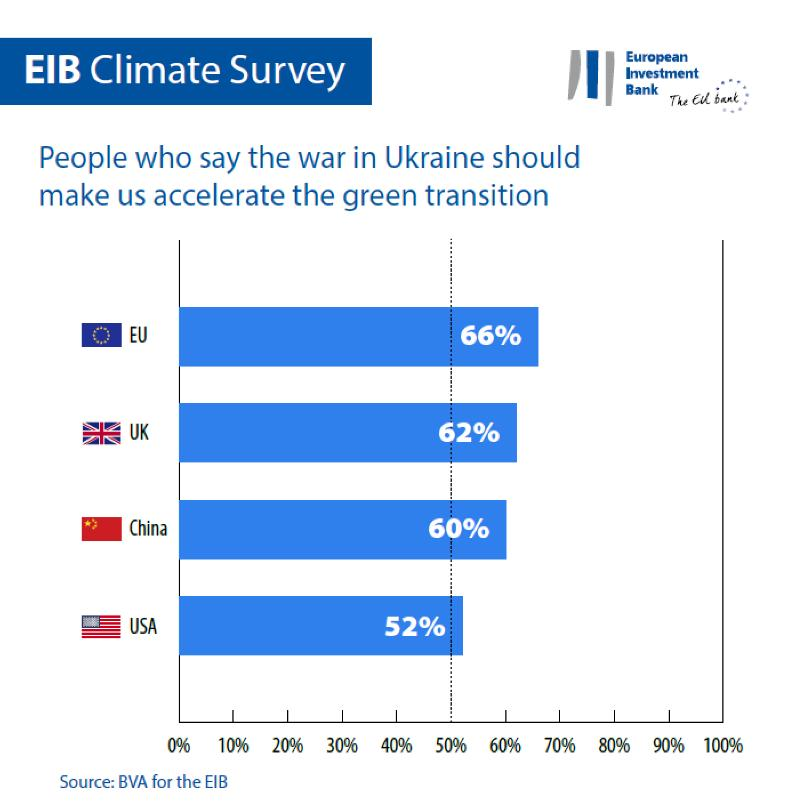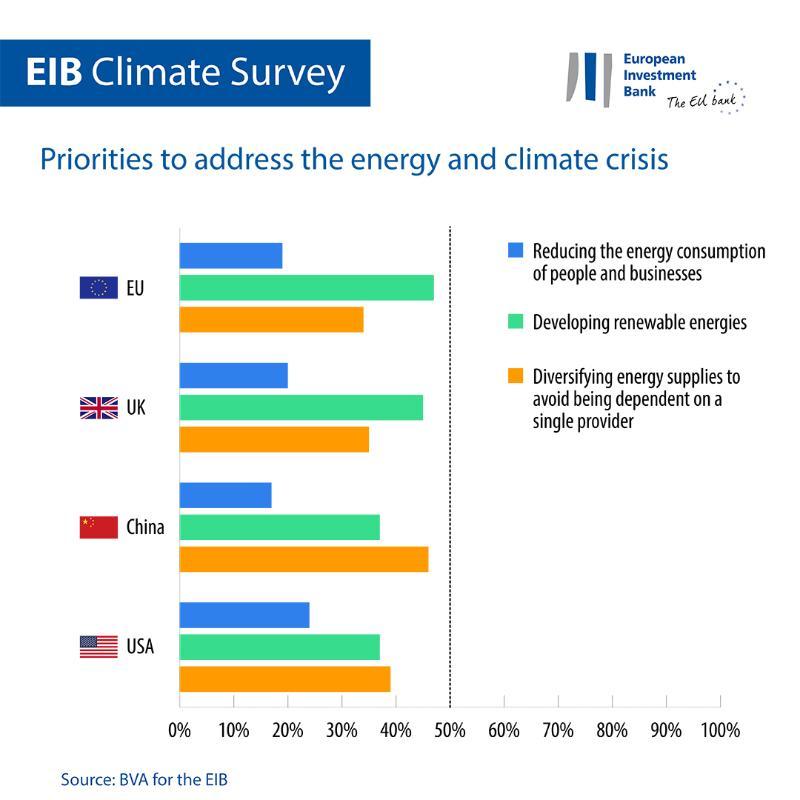Most Europeans believe a green transition is the best response to the energy price crisis caused by the Russian invasion of Ukraine. The EIB Climate Survey has the numbers
Most Europeans say the war in Ukraine provides an impetus to save energy and reduce reliance on fossil fuels, according to the European Investment Bank’s latest annual climate survey, with 66% saying the invasion’s consequences for the price of oil and gas should spur moves to accelerate the green transition. British and Chinese respondents share this view, though Americans are divided.
EU respondents also reported in high numbers (84%) that if we do not drastically reduce our use of energy and goods in the near future, we are headed for a global catastrophe. And 63% of people in the EU want energy prices tied to consumption, with the people or companies using the most energy paying higher prices.
The increased cost of living and overall financial issues topped the list of concerns in the survey of people in the European Union, the United Kingdom and the United States. In China, the COVID-19 pandemic, which was the top concern everywhere last year, remains the greatest worry.
A large majority of EU citizens and Chinese say they feel the effects of climate change in their daily lives (80% and 91% respectively). Americans (67%) and British (65%) rate the effects of climate change on their daily lives somewhat lower.

Other key findings:
- 87% of people surveyed in European Union and 85% in the UK feel that their government is acting too slowly to avert climate change. A minority of British, EU, and American respondents think that their governments will succeed in reducing carbon emissions by 2030
- Nearly half of EU and UK citizens surveyed (47% and 45%) want the government to prioritise the development of renewable energies
- 64% of EU citizens want polluting activities such as air travel and SUVs to be taxed more to account for their environmental cost
- 40% of EU respondents think that, in the short term, their government should reduce energy-related taxes (compared to 29%, 24% and 23% who feel this way in the UK, China and the US). Other measures, such as capping or regulating the price of gas, oil and coal, are favoured more by the British, Chinese, and Americans

Conducted in partnership with BVA Group, a consulting and research firm, the EIB Climate Survey is based on more than 28 000 people in 30 countries and was conducted in August 2022. Read the full findings here.
The European Investment Bank is one of the largest investors in climate action in the world and plays a leading role in improving green standards and backing the innovation needed to fight global warming.
Ukraine war makes climate action more urgent
The war in Ukraine is an important issue for many people surveyed, because Russia’s invasion sparked a global energy crisis, increased inflation and damaged economies all over Europe and beyond. Record heatwaves and droughts in many countries contributed to a greater awareness of the impact of climate change and the urgency to act.
“Our new survey shows that the crisis is an opportunity to accelerate the transformation of our economies towards a low-carbon and climate resilient future,” says Vice-President Ambroise Fayolle, who oversees financing of climate action and the environment at the European Investment Bank.
Clean energy is a key goal of the European Union’s plan to decarbonise the energy system by 2050 for net-zero greenhouse gas emissions. The European Investment Bank is playing its role by making buildings and homes more efficient, increasing wind farms and solar parks, financing more low-carbon innovation such as better batteries for electric cars, increasing the number of electric trams, trains and buses, and upgrading the transmission network for electricity.
- Read more about energy efficiency in homes, electric cars, new trains and solar parcs on the EIB Blog.
